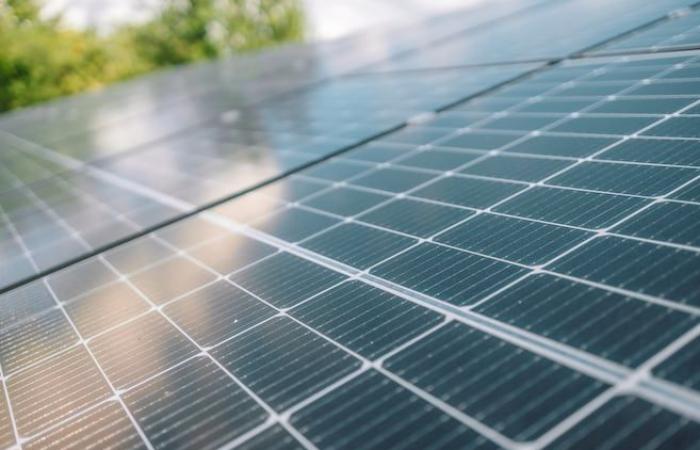If we stick to the sole point of view of autonomy (but there are others, I will come back to that), solar cannot make a big difference. A simple little calculation is enough to convince yourself of this.
The Earth receives a maximum of about 1 kilowatt (kW) of solar radiation per square meter, but that’s only true when the sun is at its zenith — it’s less, before and after. Over a full day where a vehicle spends, say, 10 hours in direct sunlight in the middle of summer, we can count on an average of around 0.8 kW/m² at best, estimates Jennifer Bauman, professor of electrical engineering at McMaster University who has worked extensively on these issues.
The roof and hood of a vehicle can accommodate a good 3 m² of panels, but the inexpensive models currently available only convert about 20% of solar radiation into electrical current, and there is a small portion that is lost when energy is converted into charge in the battery. Ultimately, in the best case scenario, we cannot expect more than a production of more than 5 kiloWatts-hour (therefore a power of 1000 watts maintained for 5 hours) per day from a car equipped with of solar panels, “if not even 4.5 kWh,” estimates Ms. Bauman.
If I make a rule of three with my hybrid car, which covers 60 kilometers on a full charge of 16 kWh, that means that even if I cover it with panels and make it spend 10 hours under a summer sun, we won’t would only add 17 or 18 km to its range. It’s not nothing, but it’s not Peru either and this is, let’s repeat, an absolutely ideal scenario – a more realistic production, taking into account the clouds and the seasons, would probably be around 10-12 km per day in summer, maybe even 5 km/d in winter.
It would not be enough to cover heating needs either, estimates Ms. Bauman. “The highest demand I saw for a heating system in an electric vehicle was 8 kW. Solar wouldn’t even be close [de compenser]”, she wrote to me in an email exchange.
Useful nonetheless
But none of this implies that it would be pointless to equip electric cars with solar panels. Because beyond just autonomy, solar has other advantages that still make it attractive.
For example, even though electricity production is relatively low, the panels are now so cheap that it can be economically profitable for a car owner. In a study published in 2021 in the IEEE Transactions on Transportation Electrification (IEEE is the Institute of Electrical and Electronics Engineers, an international professional association), Ms. Bauman and her colleagues estimated that equipping a vehicle with solar panels would add about $900 (after conversion to Canadian money) to its selling price, assuming that integration with assembly lines would reduce costs quite significantly.
After analyzing the habits and consumption of 150 vehicles in a real situation, they calculated that the electricity savings made thanks to the panels would repay this expense in a little more than three and a half years in the Los Angeles region, and 9 years in Detroit — where electricity is cheaper.
It takes a very specific design for a car to be entirely powered by solar energy, because we don’t receive that much radiation per square meter and the panels only convert about 20% into electricity. (Associated Press/Associated Press)
This period would be quite a bit longer in a context like that of Quebec, probably to the point of making the thing of little economic interest, because our rates are very low: 6.7¢/kWh for the first 40 kWh, and 10.3¢ thereafter, while the prices used in the study varied, depending on the time of day, between 17 and 26¢/kWh (depending on the time of day) in Los Angeles and from 6 to 28¢ /kWh in Detroit. But if it is economically interesting on the American market, there is a chance that it will eventually happen.
Moreover, indicates Ms. Bauman in this regard, “I am currently working on a project with General Motors to try to integrate this technology into mass production. So hopefully this will be a real option within a few years!”
There would also be environmental benefits to equipping electric cars with solar panels, especially in places where electricity is generated in gas or coal plants, which is obviously not the case here. In a context like ours, the main advantage would undoubtedly be to remove some pressure on the Hydro-Québec network, which the decarbonization of transport and the rest of the economy will plunge into a situation of shortage.
In Ms. Bauman’s study, “we found [une réduction de la demande en électricité liée aux transports] 21.5% in Los Angeles and 17.5% in Detroit, she says. This is because most people use around 20 to 25 kWh of energy per day for their car travel, so solar can replace up to a fifth of this consumption. Which, in my eyes, is very good when we consider that this saving would be multiplied by millions of cars.
And that’s without taking into account the fact that there is something more efficient about producing electricity at the place where it is consumed, because this avoids the losses that are incurred during the transport of energy — l Ms. Bauman’s article talks about losses of up to 12% on the American network, but this varies between 5 and 6% in Quebec according to the Régie de l’énergie.
So maybe, yes, we will eventually equip cars with photovoltaic cells. To be continued…
* * * * *
Do you have questions about the world around you? Whether they concern physics, biology or any other discipline, our journalist will be happy to answer them. In our eyes, there is no “stupid question”, no question “too small” to be interesting! So write to us at: [email protected].






